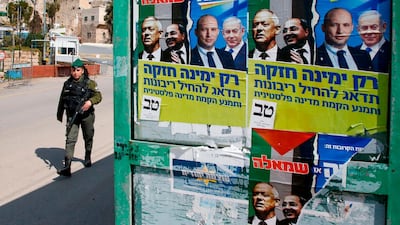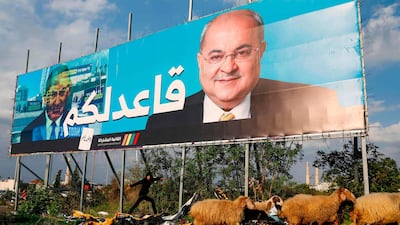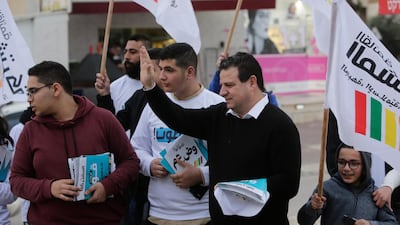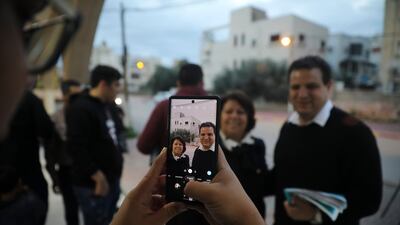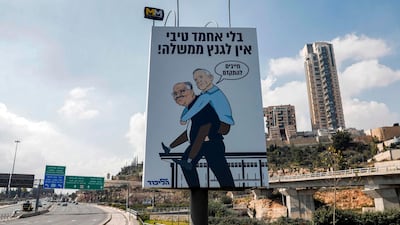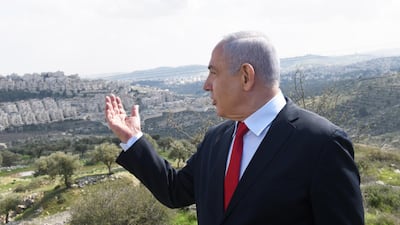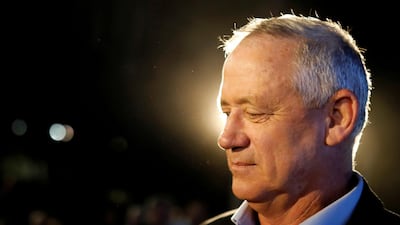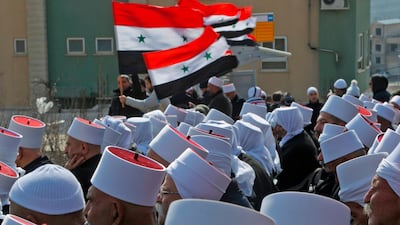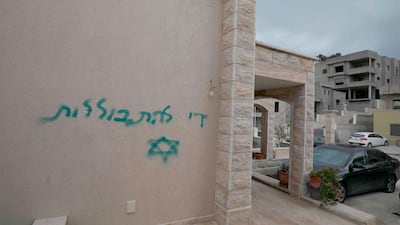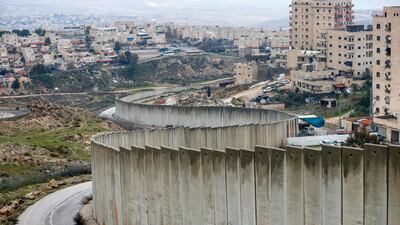Israelis go to the polls on Monday for the third time in less than a year, with Palestinian citizens hoping to shake up the political system as Prime Minister Benjamin Netanyahu fights to stay in power and out of prison.
In the months since Israelis last voted in September, Washington has released its long-awaited Middle East peace plan and Mr Netanyahu has been indicted on corruption charges.
But despite such developments and weeks of campaigning, further political deadlock seems likely as polls show few Israelis will switch allegiances although the growing political fatigue means turnout is expected to drop.
Mr Netanyahu’s right-wing Likud party is set to again come out tied with the centrist Blue and White party, led by former army chief Benny Gantz, with each winning 33 or 34 seats according to polls published Friday.
Both would need to link up with smaller parties in the 120-member Knesset to form a government, but neither leader is expected to gain the necessary support of 61 lawmakers.
Mr Netanyahu and Mr Gantz have rejected the Arab-led Joint List as a possible coalition partner, despite expectations it will be the third-largest alliance with 13 or 14 seats.
The September election saw an uptick in turnout among Arab and Palestinian citizens of Israel, also called Arab Israelis, widely seen as a reaction to Mr Netanyahu’s vilification of the community. If the momentum continues, the Joint List could get a further boost at the polls.
“There is a great feeling of change in the street, they feel that they might create or introduce a big change in Israeli politics at large,” said Arik Rudnitzky, a researcher in Arab-Jewish relations at the Israel Democracy Institute.
The alliance has pledged to tackle issues such as violent crime in Arab neighbourhoods, while also reaching out to other communities with adverts in Yiddish and Amharic.
"I think this time the Joint List, the components were not busy with their own dividing lines and past rivalries, they were very clear and conveyed a message of unity," Mr Rudnitzky told The National.
No other party is making serious efforts to win the support of Palestinian citizens of Israel, who make up around 20 per cent of the population.
Towards the end of the latest campaign, Mr Netanyahu made an appearance in an Arab constituency in northern Israel. But the meeting was met with protest, while an interview with Arabic-language media appears to have fallen flat.
Yara Hawari, a senior fellow at the Al Shabaka Palestinian policy network, said Arabs are driven to vote for the Joint List despite knowing it will not be in government.
"There's a glass ceiling that Palestinians can't smash through and I think that deep down a lot of people know that, but Palestinians hope they can achieve the best they can within this [political] structure," she told The National.
The prime minister has long courted the pro-settlement camp and in February announced thousands of new settler homes in occupied East Jerusalem, which are viewed as illegal by most of the international community.
Mr Netanyahu has also pledged to annex the occupied West Bank, as outlined in the US peace plan unveiled in January, but he has been unable to put the plan into action ahead of the election.
Israel’s longest-serving premier, Mr Netanyahu convincingly saw off a leadership challenge in December but the Likud campaign has been marred by his legal woes.
Just two weeks after the election, Mr Netanyahu will stand trial on corruption charges he denies. Earlier this year the prime minister made a bid for parliamentary immunity, but pulled the request on realising he did not have enough support among lawmakers.
Mr Gantz has repeatedly told voters that Mr Netanyahu will be far too busy with the court battle to govern the country, presenting himself as the trustworthy alternative.
Although turnout is not expected to fall significantly, Israelis are certainly dismayed by the state of politics according to one poll. The election was deemed “dirty” by 44 per cent and “boring” by 32 per cent of respondents, in a survey published by Israel Hayom newspaper on Friday.
Some are making light of yet another election, with a twist on a Hebrew phrase that people bumping into each other twice should get ice cream the third time. US-based Ben & Jerry's ice cream company, famed for is jovial flavours, has launched the special “One Sweet Vote” variety for the election that includes chocolates shaped like the peace symbol.
But the sugar hit will wear off quickly if the polls prove accurate, leading to weeks of tough coalition talks.
With all possible solutions rejected after the September vote and no sign that political leaders are willing to change their positions, Israel could be heading to a fourth election before the end of the year.
While Arab lawmakers are expected to be kept at the sidelines, they could well shake-up Israeli politics but virtue of their exclusion by Mr Netanyahu or Mr Gantz.
“One of the main impacts they have is disrupting the standard coalition making process,” said Ms Hawari. “It’s a problem because it’s very difficult to form a government without them.”
